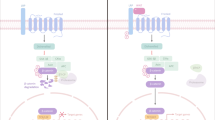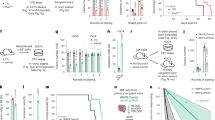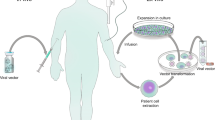Abstract
Anti-angiogenic therapies based on targeted disruption of the tumor microvascular network have been proposed for cancer treatment. Inhibitors of the endothelial cell pro-survival pathway mediated by VEGF were shown to activate caspases and cause microvascular regression, but the efficacy of this strategy can be hindered by the engagement of redundant survival pathways. Alternatively, if direct activation of an apical pro-apoptotic caspase is sufficient to disrupt microvessels in vivo, such a strategy could potentially override upstream endothelial cell survival inputs and disrupt tumor neovascular networks. Here, we fused caspase-9 to a mutated FKBP12 domain to express an inducible caspase-9 molecule (iCaspase-9) that can be activated by a cell-permeable dimerizer drug, and transduced this construct into primary endothelial cells. We found that drug-induced dimerization of iCaspase-9 is sufficient to activate endogenous caspase-3 and trigger apoptosis even when endothelial cells are treated with the pro-survival factors VEGF or bFGF. A single intraperitoneal injection of the dimerizer drug induced apoptosis of endothelial cells expressing iCaspase-9 and elimination of human microvessels engineered in immunodeficient mice. These results demonstrate that the activation of iCaspase-9 disrupts microvessels in vivo, and suggest a novel anti-angiogenic strategy based on the expression and controlled activation of an inducible death gene in neovascular endothelial cells.
This is a preview of subscription content, access via your institution
Access options
Subscribe to this journal
Receive 12 print issues and online access
$259.00 per year
only $21.58 per issue
Buy this article
- Purchase on Springer Link
- Instant access to full article PDF
Prices may be subject to local taxes which are calculated during checkout






Similar content being viewed by others
References
Nör J.E., Polverini P.J. . Role of endothelial cell survival and death signals in angiogenesis Angiogenesis 1999 3: 101–101
Gerber H.B., Dixit V., Ferrara N. . Vascular endothelial growth factor induces expression of the antiapoptotic proteins Bcl-2 and A1 in vascular endothelial cells J Biol Chem 1998 273: 13313–13313
Nör J.E., Christensen J., Mooney D.J., Polverini P.J. . Vascular endothelial growth factor (VEGF)-mediated angiogenesis is associated with enhanced endothelial cell survival and induction of Bcl-2 expression Am J Pathol 1999 154: 375–375
Gerber H.P. et al. Vascular endothelial growth factor regulates endothelial cell survival through the phosphatidylinositol 3’-kinase/Akt signal transduction pathway. Requirement for Flk-1/KDR activation J Biol Chem 1998 273: 30336–30336
Papapetropoulos A. et al. Angiopoietin-1 inhibits endothelial cell apoptosis via the Akt/survivin pathway J Biol Chem 2000 275: 9102–9102
Araki S., Simada Y., Kaji K., Hayashi H. . Role of protein kinase C in the inhibition by fibroblast growth factor of apoptosis in serum-depleted endothelial cells Biochem Biophys Res Commun 1990 172: 1081–1081
Stromblad S., Cheresh D.A. . Integrins, angiogenesis and vascular cell survival Chem Biol 1996 3: 88–88
Benjamin L.E., Keshet E. . Conditional switching of vascular endothelial growth factor expression in tumors: induction of endothelial cell shedding and regression of hemangioblastoma-like vessels by VEGF withdrawal Proc Natl Acad Sci USA 1997 94: 8761–8761
Nör J.E. et al. Up-regulation of Bcl-2 in microvascular endothelial cells enhances intratumoral angiogenesis and accelerates tumor growth Cancer Res 2001 61: 2183–2183
Shaheen R.M. et al. Tyrosine kinase inhibition of multiple angiogenic growth factor receptors improves survival in mice bearing colon cancer liver metastases by inhibition of endothelial cell survival mechanisms Cancer Res 2001 61: 1464–1464
Detmar M. et al. Overexpression of vascular permeability factor/vascular endothelial growth factor and its receptors in psoriasis J Exp Med 1994 180: 1141–1141
Nickoloff B.J. et al. Aberrant production of interleukin-8 and thrombospondin-1 by psoriatic keratinocytes mediates angiogenesis Am J Pathol 1994 144: 820–820
Alon T. et al. Vascular endothelial growth factor acts as a survival factor for newly formed retinal vessels and has implications for retinopathy of prematurity Nat Med 1995 1: 1024–1024
Bousvaros A. et al. Elevated serum vascular endothelial growth factor in children and young adults with Crohn's disease Dig Dis Sci 1999 44: 424–424
Kerbel R.S. . Tumor angiogenesis: past, present, and the near future Carcinogenesis 2000 21: 505–505
Browder T. et al. Anti-angiogenic scheduling of chemotherapy improves efficacy against experimental drug-resistant cancer Cancer Res 2000 60: 1878–1878
Klement G. et al. Continuous low-dose therapy with vinblastine and VEGF receptor-2 antibody induces sustained tumor regression without overt toxicity J Clin Invest 2000 105: R15–R15
MacCorkle R.A., Freeman K.W., Spencer D.M. . Synthetic activation of caspases: artificial death switches Proc Natl Acad Sci USA 1998 95: 3655–3655
Clackson T. . Redesigning small molecule–protein interfaces Curr Opin Struct Biol 1998 8: 451–451
Hu Y., Ding L., Spencer D.M., Nuñez G. . WD-40 repeat region regulates Apaf-1 self-association and procaspase-9 activation J Biol Chem 1998 273: 33489–33489
Fan L. et al. Improved artificial death switches based on caspases and FADD Hum Gene Ther 1999 10: 2273–2273
Jin L. et al. In vivo selection using a cell-growth switch Nat Genet 2000 26: 64–64
Li P. et al. Cytochrome c and dATP-dependent formation of Apaf-1/caspase-9 complex initiates an apoptotic protease cascade Cell 1997 91: 479–479
Nuñez G., Benedict M.A., Hu Y., Inohara N. . Caspases: the proteases of the apoptotic pathway Oncogene 1998 17: 3237–3237
Nör J.E. et al. Engineering and characterization of functional human microvessels in immunodeficient mice Lab Invest 2001 81: 453–453
Folkman J. . Tumor angiogenesis: therapeutic implications N Engl J Med 1971 285: 1182–1182
Folkman J. . Angiogenesis in cancer, vascular, rheumatoid and other disease Nat Med 1995 1: 27–27
O'Reilly M.S. et al. Endostatin: an endogenous inhibitor of angiogenesis and tumor growth Cell 1997 88: 277–277
Lee C.G. et al. Anti-vascular endothelial growth factor treatment augments tumor radiation response under normoxic or hypoxic conditions Cancer Res 2000 60: 5565–5565
Korhonen J. et al. Endothelial-specific gene expression directed by the Tie gene promoter in vivo Blood 1995 86: 1828–1828
Gory S. et al. Vascular endothelial-cadherin promoter directs endothelial-specific expression in transgenic mice Blood 1999 93: 184–184
St. Croix B. et al. Genes expressed in human tumor endothelium Science 2000 289: 1197–1197
Reynolds P.N. et al. A targetable, injectable adenoviral vector for selective gene delivery to pulmonary endothelium in vivo Mol Ther 2000 2: 562–562
Arap W., Pasqualini R., Ruoslahti E. . Cancer treatment by targeted drug delivery to tumor vasculature in a mouse model Science 1998 279: 377–377
Trepel M., Grifman M., Weitzman M.D., Pasqualini R. . Molecular adaptors for vascular-targeted adenoviral gene delivery Hum Gene Ther 2000 11: 1971–1971
Nicklin S.A. et al. Selective targeting of gene transfer to vascular endothelial cells by use of peptides isolated by phage display Circulation 2000 102: 231–231
Nör J.E. et al. Thrombospondin-1 induces endothelial cell apoptosis and inhibits angiogenesis by activating the caspase death pathway J Vasc Res 2000 37: 209–209
Nicholson D.W. et al. Identification and inhibition of the ICE/CED-3 protease necessary for mammalian apoptosis Nature 1995 376: 37–37
Acknowledgements
We thank Y Lazebnik for the gift of monoclonal antibodies, AD Miller for the gift of retroviral vector, and ARIAD Pharmaceuticals for the dimerizing agent AP20187. We thank J Westman and C Strayhorn for preparation of histological sections; M Kukuruga for help with flow cytometry; and T Ross and P Lucas for critical review of this manuscript. This research was supported by grants CA70057 (to GN) and CA77266 (to DMS) from the National Institutes of Health; and the University of Michigan Comprehensive Cancer Center's Institutional Grant from the American Cancer Society and start-up funds from the University of Michigan School of Dentistry (to JEN).
Author information
Authors and Affiliations
Rights and permissions
About this article
Cite this article
Nör, J., Hu, Y., Song, W. et al. Ablation of microvessels in vivo upon dimerization of iCaspase-9. Gene Ther 9, 444–451 (2002). https://doi.org/10.1038/sj.gt.3301671
Received:
Accepted:
Published:
Issue Date:
DOI: https://doi.org/10.1038/sj.gt.3301671
Keywords
This article is cited by
-
Cell-to-cell variability in inducible Caspase9-mediated cell death
Cell Death & Disease (2022)
-
Induction of rapid and selective cell necrosis in Drosophila using Bacillus thuringiensis Cry toxin and its silkworm receptor
BMC Biology (2015)
-
Cancer gene therapy with iCaspase-9 transcriptionally targeted to tumor endothelial cells
Cancer Gene Therapy (2008)
-
Antiangiogenic gene therapy: disruption of neovascular networks mediated by inducible caspase-9 delivered with a transcriptionally targeted adenoviral vector
Gene Therapy (2005)
-
Apoptosis-based therapies and drug targets
Cell Death & Differentiation (2005)



